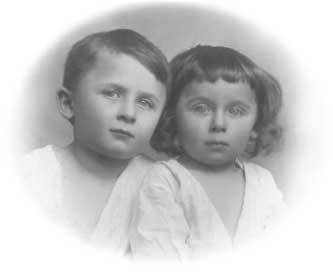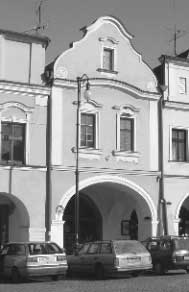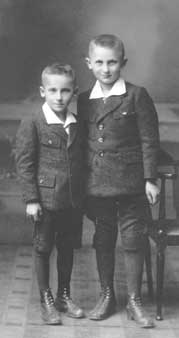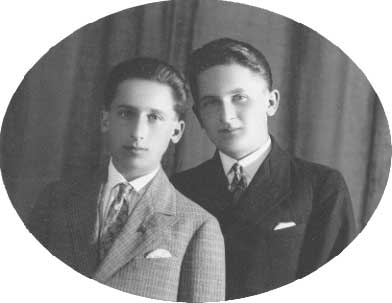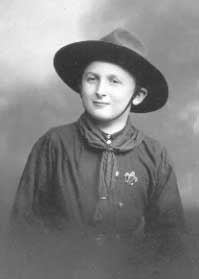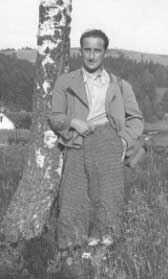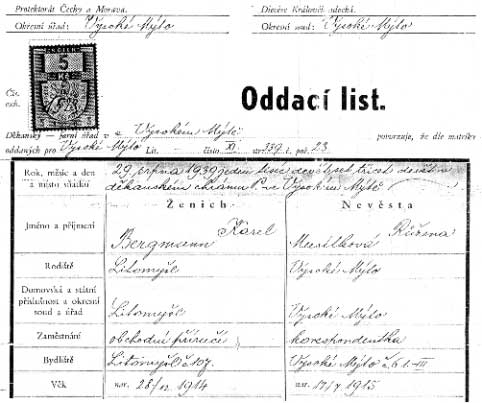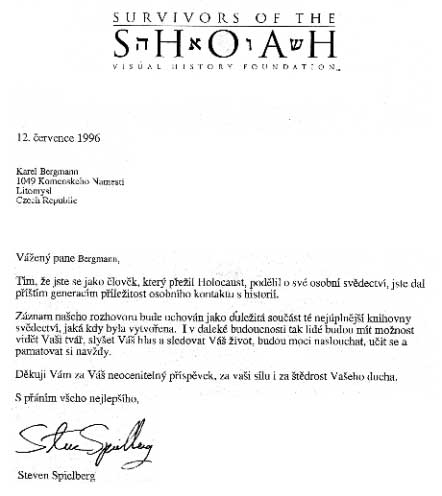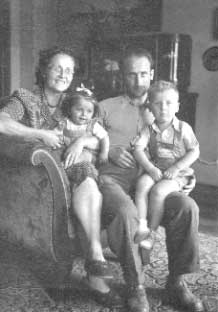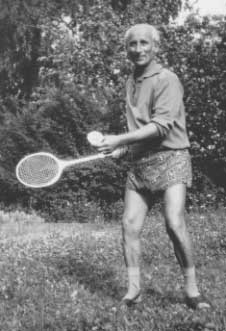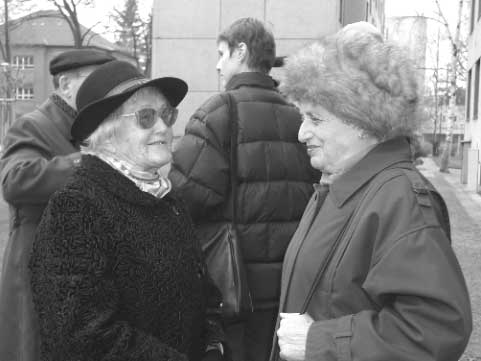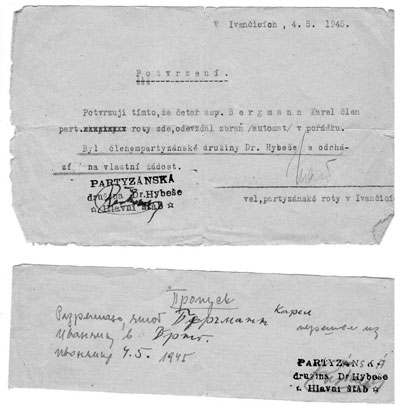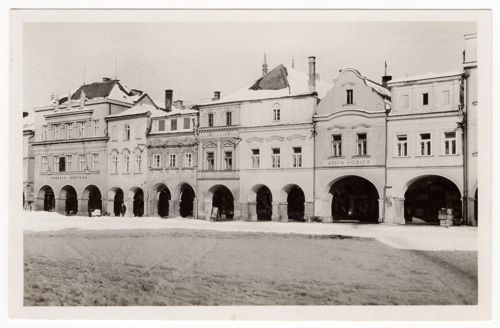The Great Love Story
Karel Bergmann was born on 28 December 1914 in Litomyšl to his parents Cornelie (born on 12 February, 1886, a member of Heřman Popper´s family) and Stanislav Bergmann (born on 5 February, 1886). At that time, he already had a brother, Jiří (born on 14 September, 1912 in Litomyšl). The family lived in what is now Smetana Square, in house no. 107, where they had a flat on the first floor, and a haberdasher's shop on the ground floor (there is a shop there today owned by Pavel Skřiváček´s GLASS-PORCELAIN-TEXTILE firm).
After his studies at the Grammar School, Jiří went to Prague to study medicine. Karel, having finished Grammar School in Litomyšl and Trade School in Chrudim, went to the school for infantry officers in Vysoké Mýto from 1 October, 1935 to 10 September, 1936. Then he joined Alois Jirásek's 30th Foot Regiment, where he reached the rank of lieutenant.
In Vysoké Mýto, he met Růžena Musílková, who worked as a secretary in the Sodomka Firm (a large-scale bodywork manufacturer). Růžena had gone with her friends to dance at the Kobylka Café (U Kobylků ?) on 29 January, 1936. Karel arrived with a group of friends. All of Růžena´s friends had partners and were dancing with them. Růžena was left sitting alone at the table. Karel felt sorry for her, and so he asked her to dance. This is how they met and started going out. Karel had not had a girlfriend before and his friends laughed at him, giving him various "useful pieces of information".
Every time Karel passed the offices of the Sodomka Firm with his platoon, the soldiers started singing. It was a sign for Růžena. She used to run outside to chat to Karel for a while and to fix a date for the evening. Mrs. Bergamann recalls that Mr. Sodomka was very kind to her - when he heard the singing, even if he was dictating to her, he would say: "Hurry up and run outside, Karel's coming."
In September 1937, Karel Bergmann started work in his father's shop in Litomyšl. He would one day take over this shop from his father. He returned to the army once more time, but only for a short period during mobilization (24 September - 13 November, 1938).
Mrs. Růžena Bergmann remembers that the Bergmanns´ sons had a motorcycle, which they shared. Then they sold it and Karel drove a car, perhaps a Skoda, to Vysoké Mýto where he had dates with Růžena. "Every Sunday, we went for a trip somewhere," says Mrs. Bergmann. "Karel was a very good driver but one time, when we were going to Mýto along a B-road, we ended up stuck in a ditch and couldn't get out. I decided to go to the nearby village for help. I met a man who took his horse, hitched it up to the car and pulled us back onto the road. The next day, my father found out and we got into trouble. My parents were very cross with me."
Růžena and Karel also made regular trips to Ústí nad Orlicí. "It used to be a kind of family outing. First, Karel would pick me up in Vysoké Mýto, and then Karel´s parents would join us in Litomyšl and off we would go to Ústí to visit Karel´s Grandpa's house, where the whole family would meet. At that time, I used to knit a lot, even during the visits to Grandpa. Later, Karel told me that his relatives would always say: Well, we've got a valuable addition to the family here. She'll always find something to do."
When the fascists closed down the universities, Jiří came back home and bad times started for the family. For example, it was very difficult for them to part with their dog when purebred dogs were ordered to be handed over to authorities. Cornelie personally took their dog to Pardubice. The ban on travelling from one town to another was especially terrible for Stanislav. He had leukaemia, but, because of the ban, he was not allowed to go to Pardubice, where they had been treating him. He had to stay at home, dying slowly.
Růžena and Karel decided to get married despite everything. Růžena´s parents were "beside themselves with worry", but she hoped to be able to protect Karel. On 29 August, 1939, Růžena and Karel got married in St. Laurence's Catrholic Church in Vysoké Mýto. Apart from relatives, the bride's friends and Mrs. Sodomková with her children also attended the ceremony. She gave Růžena a toy chimney sweep to bring her good luck.
The newlyweds lived in Karel´s parents house, in a flat above the shop. Růžena kept travelling every day to Vysoké Mýto, to the Sodomka Firm, and Karel worked in the shop. Růžena remembers that she could not cook at all, but it wasn't a problem because the Bergmanns had a cook, Mrs. Hajzlerová, who took care of Mrs. Cornelie Bergmann´s household, since she could be in the shop all day. "Our marriage was wonderful," Mrs. Bergmann says nowadays. "Karel was such an easy-going man, but I got angry from time to time. Once I raised my hand and it might have looked as if I wanted to hit him. Karel took my hand and told me: Please, don´t do that. I love you and it would make me very sad."
On 13 February, 1940, however, Albin Hobler, a German from Sudetenland, living in Svitavy, came to the shop with a gun in his hand and ordered them to hand over the shop. The Bergmanns had to leave their beautiful flat and to move to a smaller one in the house in the backyard. Only Růžena was allowed to stay working in the shop (at the end of 1939 she had left the Sobotka Firm and started to work in the family business) to help the new owners out. She knew the shop well and so tried to use her knowledge during the period which followed (from 28 February, 1941) to steal as many warm clothes as possible for the family. Of course, they had to let Mrs. Hajzlerová go. Karel and Jiří found jobs outside of Litomyšl: Jiří in a farm in Tisová near Vysoké Mýto and Karel in the nearby village of Vlčkov, on Mr. Kašpar's farm.
During the war Růžena and Karel used to visit the Holomeks family in Lány to listen to foreign radio broadcasts. "Mrs. Holomek had a hole drilled in the door and filled it with a cork. She used to peep though it to see if anybody was coming, so we were not caught," says Růžena.
Stanislav Bergmann died in 1942. Cornelie and Jiří left for Pardubice on 2nd December, 1942. This train, full of Jews from Litomyšl, left the railway station at five in the morning. Růžena and Karel saw their relatives off, but Jiří couldn't be there because he'd had an operation recently and wasn't in good health. It was the last time they saw each other. The last we know about Jiří from the text of Terezin "1942 transported to the East", Cornelie died in Auswitz, where she was sent on 23 January, 1943 on CR train no. 1206.
Karel was sent by the Labour Office to work on the building of the Seč Dam near Chrudim. There was a detention camp for Jews from mixed marriages there. Růžena went to visit him from time to time. When the dam was finished, Růžena lost touch with him. Later, Karel sent his wife a postcard from Oslavany near Brno. There were coalmines there, controlled by the Germans. Karel stayed there from 3 September, 1943 until the end of the war.
Meanwhile, Růžena had lost her job in the shop and the Labour Office ordered her to start work at the Škodawerke munitions factory in Polička Bořiny. She visited Karel twice a year. "When Karel left the pit, instead of returning to the camp, he used to go the back way along the slag heaps to the house of Adam, a miner, where I would be waiting for him. Karel still had a lieutenant's uniform at home from before the war. Bit by bit, I bartered it for food and cigarettes, which I took with me to Oslavany. I also learned to bake, mostly ginger bread for Karel so he had a supply," recalls Mrs. Bergmann.
Karel and his wife decided to have a baby, hoping that the war would end before the baby was born. But their baby boy was born on 17 April, 1944 and the war was still going on. They named him Karel. Růžena´s parents, the Musílek family, supported their daughter and the money in a bank account, opened by the Bergmanns before the war, also helped. The only thing was that the withdrawal form had to be signed by Karel. Unfortunately, the account disappeared at the end of the war.
In spring, 1945, Karel escaped from detention camp in Oslavany and joined the partisans under Dr. Hybeš. He returned to Litomyšl in May, 1945. Fortunately, his house was empty at that time, because Albin Hobler had been called up at the last minute and nobody had heard from him since. His wife had not waited for the end of the war, but had all her furniture and precious things sent back to Svitavy, where she moved.
While Karel was trying to get better, he worked as a caretaker and later manger of his own shop. His house and shop were returned to him as late as 30 September, 1951, but nothing left there was usable and everything had to be thrown away. Růžena´s father lent him 50,000 crowns so as he could buy new goods. Just as things started going well and Karel was able to pay the money back, businesses were nationalized. Karel found himself a job in the state-owned Orličan factory, where he stayed until he retired. Růžena changed office jobs several times.
On 5 November, 1946, their daughter Eva was born. Both children moved to Canada (Calgary) after they finished their studies at Litomyšl Grammar School (Karel in 1968 and Eva in 1969). They have lived there with their families ever since.
Because of the planned rebuilding of the house on Smetana Square (which did not eventually happen), the Bergmanns had to move to the newly built housing estate on Komenský Square, no. 1049. Karel lived to see properties being returned to their original owners. His house was finally returned to him in 1991, but in a very run-down state. He was glad to then find a buyer who wanted to open a shop in the house.
Karel Bergmann died on 31 May, 1996.
Klára Nováková and Lenka Škeříková
